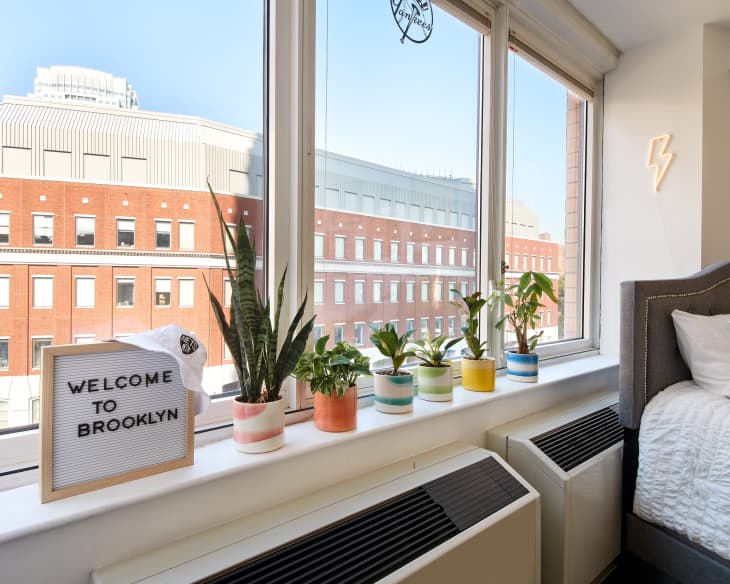I’ll Never Ever Hang Curtains (or Blinds) — Here’s Why I Refuse to Cover My Windows

When you move into a new apartment or home, there are essentials almost everyone agrees on: a mattress, a table, a sofa. Then there are curtains, and that’s when the road splits into two lanes — curtain people and bare window people. I, for one, fall firmly into the former camp.
I know this might not work for everyone — when friends ask how I sleep through the city lights coming in my windows or the early-morning sunlight, I have to admit that I have been blessed with the ability to sleep through anything. I’ve never had the need for blackout curtains. And whenever the morning sun does wake me up, I consider it a sign that it’s time to get up anyway.
Even when I lived in New York City for five years, I never once had curtains. In one apartment, my windows directly faced a neighbor’s kitchen; in another, more intimately, it looked right into someone else’s bedroom. No one talked about it, and no one cared.
The choice to have curtains or not sparks a lot of debate, with some people labeling it a class difference. Eschewing curtains can signal that you’re not concerned about the money-saving benefits of controlling your home’s temperature with window coverings and that you have multiple windows to enjoy, not just one or two.
As a freelance writer, I’m certainly not leaving my windows bare to signal my income bracket. But still, you’ll never catch me hanging curtains — here’s why I think a bare window will always reign superior.
Natural light makes me feel happier.
“Exposure to sunlight is known to increase serotonin levels as well as allowing vitamin D production, both of which impact your mood and energy levels,” explains clinical psychologist Alara Alagül. “Conversely, insufficient exposure to sunlight is linked to lower levels of serotonin which may result in feelings of depression.”
Not hanging curtains allows natural light to flow in, which does wonders for your mental health. It’s an effect I’ve noticed in every place I’ve lived. When I’m in a space filled with light, I also feel lighter. It motivates me to work — or at least to get the work done so I can go outside and enjoy the sun.
There are some cultural differences.
Alagül points out that though it’s a controversial topic in the U.S., people in Scandinavian countries commonly don’t hang curtains. “While having no curtains or keeping them open at all times is the norm for those cultures, it can be considered inappropriate to keep them open in some others. Our cultural background dictates what we consider normal in many aspects of our lives, and its impact on how we make this choice is no different,” she says.
Even when I lived in Manhattan, my understanding of the social contract between New York neighbors to pretend you can’t see and hear every part of each other’s lives felt, in some ways, like a cultural stance. When I bring this up to anthropology doctoral candidate Aslıhan Niksarlı, who lives in Istanbul, she agrees. “We have floor to ceiling windows. I will walk around in my home whatever way I want while the curtains are open. Since when do we comment on each other’s lives inside the home?”
It helps me feel less isolated.
As a freelancer who often works from home, not having curtains helps me stay connected to the world — a need that was only made more urgent during the pandemic when I was desperate for any sort of outside-world interaction. I love being able to peer outside and feel less shut off from everything happening just outside, even if I have to stay in and work.
My current view overlooks a beautiful tree that’s home to a flock of sparrows. After I’ve spent too long staring at the computer, I relish looking out my window at the birds, the tree, my neighbors, and up at the sky.
One of the biggest arguments for hanging curtains is that they provide a sense of privacy and safety, but I’ve also often felt less safe when in a home where the blinds are closed because I can’t see what is happening outside. There is a Turkish idiom that roughly translates to, “I do not fear what I can see.” Being able to look out helps me feel connected to my community and more aware of my surroundings.
Alagül says the choice to curtain or not to curtain can boil down to your expectations of other people. “If you believe that the responsibility to respect your privacy and not pry falls on your neighbors, you may be more inclined to keep your curtains open,” she says. “However, if you believe that others will look and pry if they get the chance, or that they will judge you based on what they see, you may be more hesitant to do so.”
At the end of the day, as I work from home and soak in the sunlight through my bare windows, I choose to believe that they will not pry — and I return the favor to them. That’s part of the odd but beautiful sense of intimacy that comes with living in a city or close-knit community. And that’s why I’ll never cover my windows with curtains.